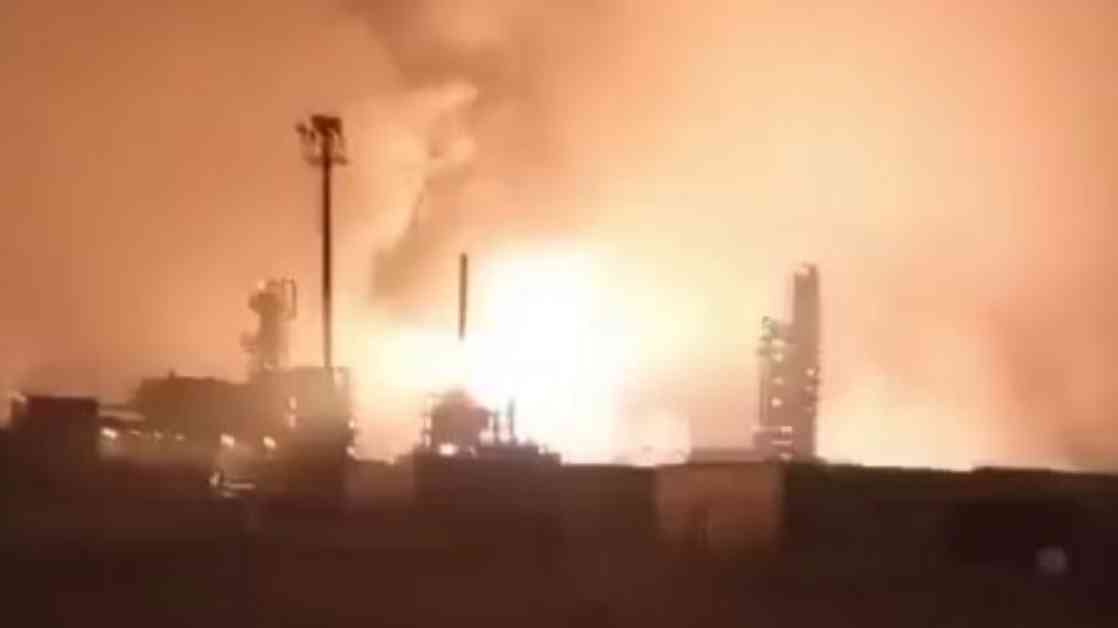A daring Ukrainian drone assault targeted Russia’s largest Lukoil refinery in the Volgograd region, causing a stir in the global oil industry. The attack, which occurred in the early hours of Monday, Feb. 3, led to a fire at the Lukoil-Volgogradneftepererabotka oil refinery after drone debris landed on the site. Fortunately, the facility managed to contain the resulting “local fires” swiftly, with no casualties reported.
The regional governor, Andrey Bocharov, confirmed the attack, marking the second strike on the plant in recent days. Just days before, on Jan. 31, another drone strike caused a fire at the refinery, escalating tensions in the already volatile region. Lukoil facilities have increasingly become targets of Ukrainian drone and cyberattacks, posing a significant threat to Russia’s oil production and distribution.
Previous Attacks and Impact
The Lukoil-Volgogradneftepererabotka refinery, one of Russia’s top 10 by production, processed a substantial 13.7 million tons of oil in 2023. However, the recent attacks have disrupted operations, leading to a significant cut in diesel production by half, approximately 10,000 tons per day. Situated in Russia’s Southern Federal District, the Volgograd refinery plays a crucial role in the country’s diesel production, accounting for nearly 7% of the total output. Additionally, the facility produces substantial amounts of gasoline and fuel oil, making it a vital asset in Russia’s oil industry.
The recent incidents at the refinery echo past disruptions caused by Ukrainian drone strikes. In February and May of the previous year, similar attacks led to shutdowns at the plant, highlighting the ongoing vulnerability of Russia’s oil infrastructure to external threats. The cause of the fires and explosions remains unclear, with conflicting reports from local sources and Russian authorities. Despite denials of external impact by Russian emergency services and the Ministry of Defense, the recurrent attacks raise concerns about the security of vital energy facilities in the region.
Strain on Russia’s Oil Industry
The attacks on the Lukoil refinery come at a challenging time for Russia’s oil industry, with overall refining volumes in 2024 dropping to their lowest levels since 2012. The Russian Defense Ministry reported intercepting 70 Ukrainian drones across various regions, indicating a sustained effort to disrupt oil production and distribution. Airports in Volgograd, Astrakhan, Kazan, Vladikavkaz, Grozny, and Makhachkala temporarily halted flights as a precautionary measure, underscoring the widespread impact of the drone attacks on critical infrastructure.
The escalating tensions between Ukraine and Russia have far-reaching implications for the global oil market, with potential ripple effects on supply chains and energy prices. As the conflict intensifies, the need for diplomatic solutions and international cooperation becomes increasingly urgent to prevent further disruptions to the oil industry. The targeted attacks on the Lukoil refinery serve as a stark reminder of the vulnerability of energy infrastructure in times of geopolitical turmoil.
As the situation continues to evolve, stakeholders in the oil industry closely monitor developments in the region, hoping for a swift resolution to the escalating conflict. The impact of the drone attacks on Russia’s largest refinery underscores the fragility of energy security in an increasingly volatile geopolitical landscape. The need for dialogue and diplomatic engagement to defuse tensions and safeguard critical infrastructure becomes paramount in the face of growing instability.

















